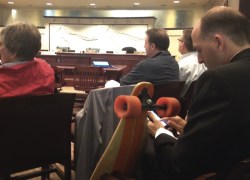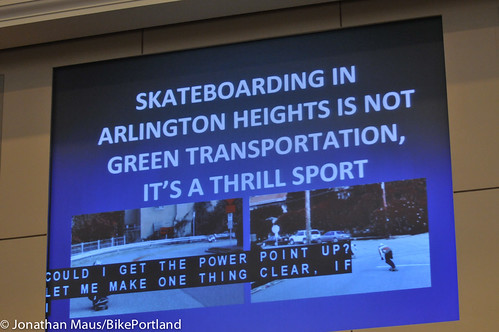
Council chambers today.
(Photos © J.Maus/BikePortland)
A proposed amendment to Portland’s city code that would ban skateboarding and “other similar devices powered exclusively by human power” (but thankfully, not bicycles) on several miles of roads in the West Hills and quadruple traffic fines on a host of related infractions, is on the agenda at City Council this morning.
*Scroll to end of post for updates.*
Since coming to light on June 11th, the proposed ban and fee increases have drawn concern from the Bicycle Transportation Alliance, the Portland Police Bureau, and many in the community who feel such a hard-handed response to the issue is unneccessary. Residents of the Arlington Heights Neighborhood, led by board member Eric Nagle, pushed for the ban because they feel it’s the only way to stop the high-speed skateboarding that has led to numerous injury collisions in the past year.
Nagle was a working member of a coalition that has worked for 11 months to improve the situation; but he says he left after he learned some members of the group were simultaneously promoting what he feels is an illegal skateboard race. Nagle called that a “slap in the face” and went directly to City Hall where he found a sympathetic ear in Commissioner Randy Leonard.
Yesterday, Leonard opened the door for a reconsideration of his proposal.
At the Council meeting today, Randy Leonard pulled together a panel of his staff and Arlington Heights residents to make a presentation outlining their concerns. I’m in Council chambers now and will be updating this story as it develops…
Leonard’s policy advisor Stu Oishi tells council that boarders are “Wildly surfing through their streets… beyond safety limits.”
An Arlington Heights neighborhood association board member said the issue affects neighborhood livability and that they have tried to solve the problem over the last couple of years but nothing has worked. “We are very afraid someone’s going to be killed.”
Eric Nagle, an attorney by day, echoed that sentiment. He gave a slide presentation and showed YouTube videos of skaters careening down streets. “The reason we’re here,” said Nagle, “Is that we are really, really afraid someone is going to die on our streets.” One of Nagle’s slides said boarding is not “green transportation” it’s a “thrill sport.”
Nagle’s presentation also included many YouTube videos shot by boarders. The videos show some very insane and dangerous riding. He is also recounting several of the chilling and sometimes serious injury collisions that he and other residents have documented.
City Commissioner Nick Fish, who oversees the Parks Bureau, asked an Arlington Heights representative about displacement of the boarders if these routes were banned. That led to an interesting exchange where the resident suggested the creation of a “lineal park” — a designated route where skating could happen completely unimpeded by cross traffic or other vehicles. Fish seemed to like that idea and he made an analogy to his work with off-road bicycling in Forest Park (where Fish’s strategy was to defer the trail discussion in favor of finding more MTB-specific locations).
When it was Leonard’s turn to speak, he made it clear that he felt this was a serious issue. He was clearly trying to re-frame the public discussion that he was simply doing the bidding of Eric Nagle. Recounting his experience as an elected official who has been a part of many public safety issues, he said, “I know the difference between a serious problem and a non-serious problem. I don’t get pulled into other peoples’ issues… The fact I’m here says this is a serious issue.”
Leonard also made it clear that he disagrees with the Portland Police Bureau’s contention that Nagle left the group talks about this issue too soon or that he did an “end-around” on the process. “Mr. Nagle did exactly what I’d want any neighborhood resident to do.”
With that being said, Leonard said he’d like to postpone this proposal until September 5th in order for the process to, “Pick up where it left off.” When the issue comes back to Council on the 5th, Leonard said he wants to see a “consensus agreement” between all the stakeholders. Absent that, Leonard threatened he would put the ordinance up for a vote.
In the interim, Leonard advised the Police Bureau to do a few enforcement missions up on the West Hills to cite road users who are operating dangeriously and illegally.
The main representative for skateboarding throughout this process, Billy “Bones” Meiners, finally got a chance to speak after Leonard’s big announcement. “I would love a chance to implement the work we’ve done,” he said, referring to the safety measures that were ready to go before the ban proposal came to light. “The busy summer skating season would be a great chance to put this into action.”
Meiners said he’d be happy to advise the police on safe and effective ways to issue citations to people skateboarding. “I actually encourage it [writing tickets to skateboarders].”
“I would like to continue doing this safely and legally,” said Meiners, “and encourage others to do the same.”
Nagle agreed. “I think the neighborhood is willing to hear what skaters have to offer… We’re looking forward to stepped up enforcement.”
Carl Larson, a bike safety educator with the Bicycle Transportation Alliance, said the current skateboarding that occurs on SW Fairview is “terrifying.” “It’s unacceptable to feel unsafe in your own neighborhood streets,” he said, “and the BTA is eager to be a partner in any effort to make sure our streets are a safe place for anyone who uses them.”
Larson testified that there needs to be a “multi-faceted effort” to the problem that should include engineering, enforcement, and education.
“The ban being proposed,” he continued, “puts all these potential solutions into enforcement.” “By keeping responsible skating legal, Portland will be able to address the problem with not just enforcement, but with engineering and education as well.”
— For more background on this issue, check our archives.




